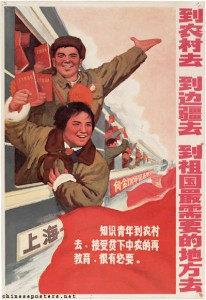
“To villages we go, to the borders we go, to places in the fatherland where we are most needed we go”, 1970, artist unknown, photo taken from chineseposters.net
The image I chose to analyze this week is a propaganda poster from the cultural revolution taken from the year 1970 in China with text reading, “To villages we go, to the borders we go, to places in the fatherland where we are most needed we go.” During this time in China, Mao’s Red Guard had begun to wreak havoc in urban areas. Mao’s faithful agents had caused too many acts of violence, becoming too chaotic for Mao’s liking. Although the Red Guard played a huge role in the Cultural Revolution and had greatly helped propel Mao back up to an esteemed government status following the failure of his “Great Leap Forward,” Mao became frustrated with the guard’s violent nature, and began sending the Red Guard into the countryside, where they would live in rural areas and learn from the peasantry.
What I found extremely interesting was that this image depicts the trust and faith the Red Guard had in Mao’s plan, and their belief that it was their duty to go out to rural areas and learn from the peasantry, despite it being Mao’s interest to reduce violence in urban areas. First, though, we must look at the denotation of the poster. Pictured is a train shipping members of Mao’s Red Guard to the coastline. They are dressed to modern standards of the time, in Mao Suit, with simple hair, no makeup, and no distinct defining gender differences. Two are featured as the focal point holding Mao’s Little Red Book; however, there are many more of them who look the exact same in the background towards the back of the train. The background is very simple, with no bursts of color, and the national color red seems to dominate the picture.
As I dug deeper with the connotation, what my eyes first drew their attention to was the facial expression of the two member’s of the Red Guard. They were smiling intensely, seeming to send the message that they were proud to be doing Mao’s work, and they knew that it was their duty to go out to the country side and learn from the peasantry. I noted the enthusiasm of the younger generation to go out to rural areas and serve their leader, but it struck me as shocking how the picture sent the message that this generation could be so happily robbed by Mao of their educational opportunities, given the goal of the revolution was to industrialize China and surpass other countries. The lack of gender defining qualities made it harder to distinguish man from woman, which to me symbolized the exaggerated message that the two genders were completely equal in this society. Their outfits and the presence of the Little Red Book further show the enthusiasm and trust the guard places in their leader Mao, and their undying efforts to please him. This leaves me feeling very sad for the generation Mao sent to the countryside, seeing how much they trusted their leader, yet watching their leader rob them of educational opportunities and a normal lifestyle.
see what happens if you could pair the denotation/connotation together. for instance, the train/destination and its connotation; the military uniform and its connotation; the little red book and the connotation ….
